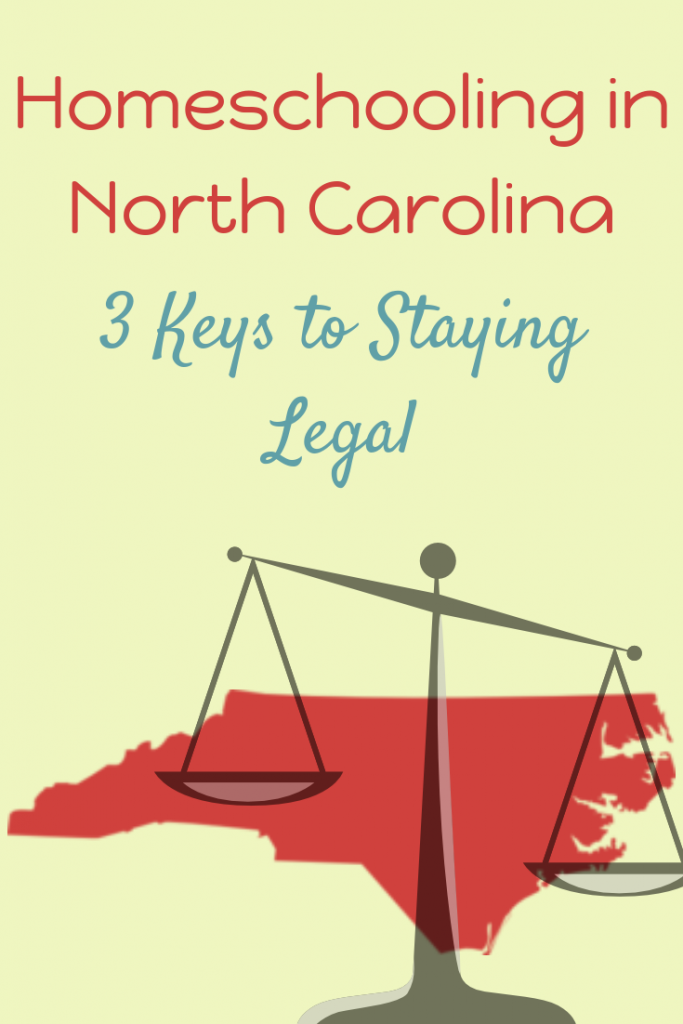Deciding to homeschool can be overwhelming — and exciting! Fortunately, if you live in North Carolina, following the homeschool law doesn’t have to be part of what makes it overwhelming. I mean, it’s hard to make the legal stuff exciting, but let’s make it as easy as possible, ok?

Welcome to the blog series on the 3 Keys to Legal Homeschooling in North Carolina!***
In this 4-part series, I’ll give you all the basics of getting legal and staying that way so that you can spend your energy where it is needed most – on your children’s learning!
So you have decided to homeschool! Or maybe you’re just thinking about it? It can be exciting, or intimidating, and likely some combination of both. And maybe you’ve thought to yourself, “But how do I do that without having a truant officer visit me? Do I just stop sending my child to school? Or never send them in the first place?”
Well, yes and no. Of course it is a little more complicated than that. But just a little! I promise!
What the law says
The first thing you should do is familiarize yourself with the website for the NC DOA Division of Non-Public Education (often referred to by homeschoolers in NC as DNPE). This is the department of North Carolina’s state government that oversees homeschools. Everything you need to know is on that website. I’m going to summarize it for you in this series of posts and clarify some things that parents often misread or misunderstand, but it is always best to go straight to the source and read directly from THE authority in the state. Now would be a good time for a little disclaimer…
The Triangle Homeschool Resource Center is not an organization engaged in providing professional legal advice and cannot be held responsible for misinformation or misinterpretation of information found here. For more, please see our Terms and Conditions.
Ahem. Now with that out of the way, here is an actual quote from our state’s law telling us how it defines homeschooling:
“Home school” means a nonpublic school consisting of the children of not more than two families or households, where the parents or legal guardians or members of either household determine the scope and sequence of academic instruction, provide academic instruction, and determine additional sources of academic instruction.
Sounds pretty simple, doesn’t it? That’s just a general definition of what the state says a homeschool is. And it’s a pretty nice definition given how complicated homeschooling can be in other states! North Carolina says that we, as parents, have a lot of freedoms to homeschool our children as we see fit by determining how, what, and when we (or those designated by us) teach!
Given that broad definition then, what is required of a homeschool?
Here are the 3 Keys to Staying Legal!
Key #1: File a Notice of Intent (NOI).
– Just once!
When you homeschool in North Carolina, you, in a sense, establish a non-public school in your home. You open your homeschool when you begin home educating at least one of your children who is age 7 or older. You do not need to refile annually, or even when you add another student to your homeschool.
– Requires proof of parent’s education.
Filing your NOI requires that you provide some information to the Division of Non-public Education, most notably proof that at least one parent has the equivalent of a high school education or better.
We’ll go into the details of this Notice of Intent in the next post of our series.
Key #2: Administer annual standardized testing.
For those of you removing your children from public school, standardized testing may be one of the headaches you were hoping to escape. But standardized testing for homeschools is nothing like the EOGs your students are used to. We’ll go more in-depth about standardized testing in post #3 of the series, but for now, here are the basics:
– There are many tests and formats available.
Standardized testing options are available as one-on-one, in a group, given by you, given by a proctor, online, fill-in-the-bubble, etc. You choose what works best for your student from a list of available options.
– You only need proof of completion.
Can I let you in on the best-kept secret of homeschooling in North Carolina? You don’t need to even look at the standardized test scores! Oh, you can, of course. And you might find them helpful when you’re planning for what to teach next. But all you need to meet the legal requirements of homeschooling is proof that an approved test was completed and scored.
Key #3: Keep records.
Record-keeping is a love/hate kind of thing for most homeschoolers. If you’re super-organized, you might want to keep all kinds of records for your children’s instruction. But if you’re easily overwhelmed by stacks of papers and planners (uh, yeah, guilty here!), you might find the idea of record-keeping daunting. Wherever you fall on that spectrum, here are the 3 things you NEED to keep in those records:
– proof of filed notice of intent,
– vaccination record or exemption letter,
– proof of completion of annual standardized testing.
In post #4 of this blog series, I will show you my super-easy way of keeping the legal records!
Are you ready to learn more?
Now that you have an overview of what the State of North Carolina requires of families that choose to educate their children at home, let’s dig into each of these 3 key areas and really get to know what it will mean for you!
(***IMPORTANT: There are actually more than just 3 “requirements” to keeping your legal homeschooling status. You can read about them in detail in a pdf from DNPE with the heading “Notice of Intent to Establish a Home School”. Click here to open this file directly from DNPE. For the purpose of helping new homeschoolers, I have summarized their list into 3 keys, and cover the rest of their bullet points in my extra tips about record-keeping.)
Next: Key #1 – Filing Your Notice of Intent to Homeschool in North Carolina


What do you have to do to start home school in your home with your grandchildren what are the qualifications I live in Chicago Illinois
Hello Ethel!
I am not currently familiar with Illinois homeschool law. You can visit HSLDA’s website for the most up-to-date information: https://hslda.org/post/how-to-comply-with-illinois-s-homeschool-law
Also, I recommend visiting iche.org and contacting a representative there for help!
https://iche.org/
So what are the legal requirements for curriculum? I’m looking at ABEKA. Do I have to do all the courses or can I just do math and English for my 5th grader? Help! I’m so clueless. New to this!! And very scared !!!!
Hello Stefanie!
Thanks for reaching out! There are NO requirements for curriculum. None. Nada. 🙂 ABEKA is a great program! And yes, you can do just math and English, especially to start, and add things as time and interest dictate.
I would love to help you feel more confident about your homeschool. I’m sure you can do this! Use the Contact Page to send me a message and we’ll set up a time to chat!!!
We started homeschooling this past January (2021), so when should we give the annually required standardized test? Does it need to occur during the “school year”, or do I have until my one-year “home schooling anniversary” date? We are still finishing up his school year and he has not finished with all of the curriculum yet. Thank you!
If my child is 5, is it better to wait until 7 years old to register?
Hi Kaitlynd! Yes, definitely wait until about a month before the 7th birthday. There’s not even a place in an NOI to account for a 5yo. Once you file, you have to do attendance and testing for your child. The standardized tests aren’t really meant for k and 1st grade, so you don’t want to start your child off with a bad testing experience either. Let them mature as much as possible ❤️
I live in NC and want to do the abeka curriculum, my son is 5 and i know it says wait till he is 7 but i want to keep him on track as if he were in school just in case we have to move him to private school.
Hi Amanda! You can teach whatever, whenever to your child. The Notice of Intent is just notification to the state that your child is accounted for. It should not have anything to do with them being on grade level in terms of knowledge or ability.